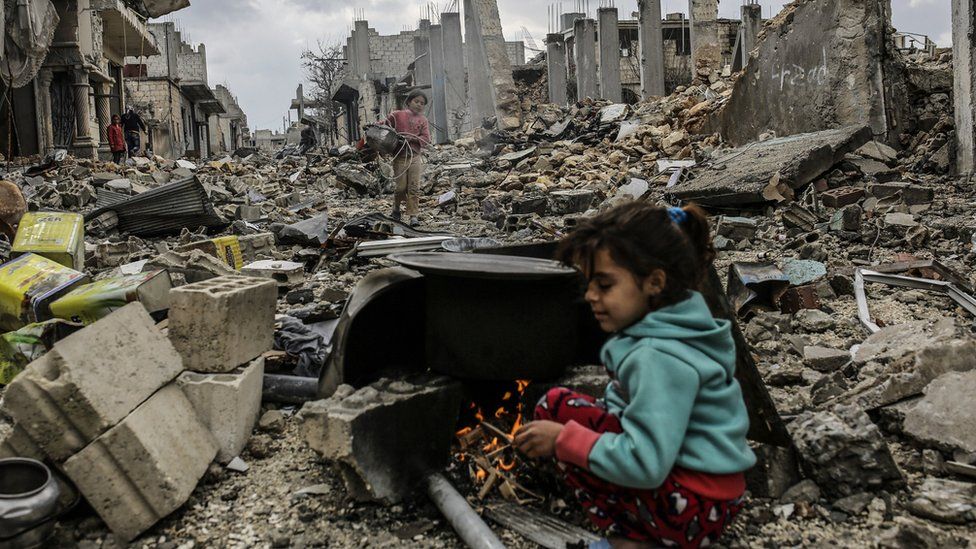Syria conflict: UN suspends peace talks in Geneva
- Published

The UN has suspended peace talks aimed at ending Syria's five-year civil war, just days after they began.
But the organisation's special envoy Staffan de Mistura insisted negotiations had not failed and would resume on 25 February.
Each side blamed the other for the collapse of the round.
It came as the Syrian government said it had dealt a major blow to the opposition by cutting a key supply route to the rebel-held city of Aleppo.
Syrian state television reported that government forces had broken the siege of Nubul and Zahraa, two towns north-west of Aleppo.
On the talks, Mr de Mistura admitted that "there's more work to be done".
"It is not the end and it is not the failure of the talks," he said.
"They came and they stayed. Both sides insisted on the fact that they are interested in having a political process started."
The head of the Syrian government delegation blamed the opposition for the suspension.
Bashar Jaafari accused them of acting under the orders of Saudi Arabia, Qatar and Turkey "to bring about the talks' failure", Syrian state television reported.
Blaming the government for the failure, Syria's opposition High Negotiations Committee (HNC) said they would not return until conditions improved on the ground.
"The whole world sees who is making the negotiations fail. Who is bombing civilians and starving people to death," the HNC's chief co-ordinator Riad Hijab said
The opposition has been angered that government offensives backed by Russian airpower have continued as talks got under way, like the one in Aleppo.
Analysis: BBC's Imogen Foulkes in Geneva
It was always known these talks would be difficult, but no-one expected them to end after just two days, with the UN special envoy standing in the driving sleet outside the opposition's Geneva hotel to deliver the news.
Staffan de Mistura insists this is a temporary pause, not failure. But these negotiations never really got started. Hardly any of the planned meetings with UN negotiators actually happened, the two sides were never even in the UN at the same time, let alone in the same room.
Their conditions for engaging in negotiations were poles apart: the opposition wanted sieges lifted and prisoners released, the Syrian government played for time, asking for a written agenda and a full list of participants.
Meanwhile, on the ground, the war rages on, with the Syrian army, backed by Russian bombing, retaking rebel-held territory. The UN says the peace talks will start again on 25 February, but if the military push continues, things in Syria could look very different by then.
The US said Russia was partly to blame for the suspension, saying its air strikes were deliberately targeting opposition groups.
"It is difficult in the extreme to see how strikes against civilian targets contribute in any way to the peace process now being explored," state department spokesman John Kirby said.
France accused the Syrian government and Russia of "torpedoing" the peace talks with its military action
But earlier, Russian Foreign Minister Sergei Lavrov stressed that it would not stop the air strikes "until we really defeat terrorist organisations like al-Nusra Front".
More than 250,000 people have died in almost five years of war in Syria.
Eleven million others have fled their homes as forces loyal to President Bashar al-Assad and those opposed to his rule battle each other, as well as the Islamic State group.
A donors' conference opens in London on Thursday aiming to raise billions in new funding for those affected.
Syria conflict - key questions
Why is there a war in Syria?
Anti-government protests developed into a civil war that, four years on, has ground to a stalemate, with the Assad government, Islamic State, an array of Syrian rebels and Kurdish fighters all holding territory.
Who is fighting whom?
Government forces concentrated in Damascus and the centre and west of Syria are fighting the jihadists of Islamic State and al-Nusra Front, as well as less numerous so-called "moderate" rebel groups, who are strongest in the north and east. These groups are also battling each other.
How has the world reacted?
Iran, Russia and Lebanon's Hezbollah movement are propping up the Alawite-led Assad government, while Turkey, Saudi Arabia and Qatar back the more moderate Sunni-dominated opposition, along with the US, UK and France. Hezbollah and Iran are believed to have troops and officers on the ground, while a Western-led coalition and Russia are carrying out air strikes.